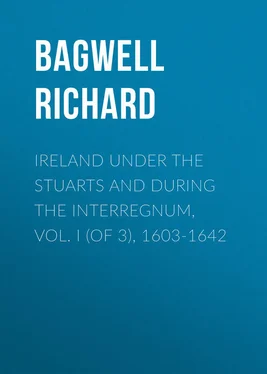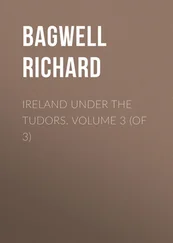Richard Bagwell - Ireland under the Stuarts and during the Interregnum, Vol. I (of 3), 1603-1642
Здесь есть возможность читать онлайн «Richard Bagwell - Ireland under the Stuarts and during the Interregnum, Vol. I (of 3), 1603-1642» — ознакомительный отрывок электронной книги совершенно бесплатно, а после прочтения отрывка купить полную версию. В некоторых случаях можно слушать аудио, скачать через торрент в формате fb2 и присутствует краткое содержание. Жанр: foreign_antique, foreign_prose, на английском языке. Описание произведения, (предисловие) а так же отзывы посетителей доступны на портале библиотеки ЛибКат.
- Название:Ireland under the Stuarts and during the Interregnum, Vol. I (of 3), 1603-1642
- Автор:
- Жанр:
- Год:неизвестен
- ISBN:нет данных
- Рейтинг книги:4 / 5. Голосов: 1
-
Избранное:Добавить в избранное
- Отзывы:
-
Ваша оценка:
- 80
- 1
- 2
- 3
- 4
- 5
Ireland under the Stuarts and during the Interregnum, Vol. I (of 3), 1603-1642: краткое содержание, описание и аннотация
Предлагаем к чтению аннотацию, описание, краткое содержание или предисловие (зависит от того, что написал сам автор книги «Ireland under the Stuarts and during the Interregnum, Vol. I (of 3), 1603-1642»). Если вы не нашли необходимую информацию о книге — напишите в комментариях, мы постараемся отыскать её.
Ireland under the Stuarts and during the Interregnum, Vol. I (of 3), 1603-1642 — читать онлайн ознакомительный отрывок
Ниже представлен текст книги, разбитый по страницам. Система сохранения места последней прочитанной страницы, позволяет с удобством читать онлайн бесплатно книгу «Ireland under the Stuarts and during the Interregnum, Vol. I (of 3), 1603-1642», без необходимости каждый раз заново искать на чём Вы остановились. Поставьте закладку, и сможете в любой момент перейти на страницу, на которой закончили чтение.
Интервал:
Закладка:
Mountjoy left Ireland on June 2, 1604, after being sworn in as Lord Lieutenant, and he never returned. He was created Earl of Devonshire, and continued till his death to have a decisive voice in the affairs of the country which he had reduced. Vice-Treasurer Sir George Carey was made Deputy, and was at once engaged with the currency question, for the state of the coinage had furnished a pretext to the Munster malcontents, and may really have had something to do with their late proceedings. He soon had the help of Sir John Davies, a native of Wiltshire, whose name is inseparably connected with Irish history, but who had been hitherto better known as a poet than as a statesman. It was perhaps the striking example of Hatton’s promotion that made the young barrister sing of dancing, but it was a poem on the immortality of the soul which attracted the King’s attention. Devonshire wished him to be made Solicitor-General for Ireland, and James readily complied. He arrived in November, and found the country richer than he supposed after all the wars, but suffering from the uncertainty caused by a base coinage.
The money issued in 1601 contained only 25 per cent. of silver, but it was easily counterfeited with a much greater alloy, and interested people gave out that it contained no silver at all. Soon after his accession James consented to revert to the old practice of Ireland, and to establish a currency containing 75 per cent. of silver; but this was ordered by proclamation to be received as sterling. The name sterling had hitherto been applied to the much purer coinage of England, and a new element of confusion was thus introduced. The base coin of 1601 was cried down at the same time, so that a shilling should be received for fourpence of the new money. When Davies arrived he found that people would not take the dross even at the reduced rate, and they were even more unwilling to do so when another proclamation cried down the new and comparatively pure shillings also from twelvepence to ninepence. The King had granted 20,000 pardons in a few months, but Davies was of opinion that he would gain more popularity by giving twopence for every bad shilling and then recalling the whole issue than by all his clemency. The Solicitor-General could speak feelingly, his fees on all the pardons being paid in copper, while the royal revenue was in the same way reduced almost to nothing. Soldiers and officials were the greatest losers, for they had to take what the proclamations allowed, while traders could not be forced to do so. A few were sent to prison for refusing, but this only caused discontent without securing obedience, and there was a riot at Galway. The matter was brought to a crisis by a case decided in the summer of 1604. 14 14 Davies to Cecil, December 1, 1603; proclamations calendared at October 11 and December 3.
The bad money was proclaimed current in May 1601, and in April, while the pure coin of England was still current in Ireland, one Brett of Drogheda, merchant, having bought wares from one Gilbert, in London, became bound to Gilbert for 200l. on condition to pay the said Gilbert, his executors or assigns 100l. sterling current and lawful money of England at the tomb of Earl Strongbow in Christchurch, Dublin, on a certain future day, which day happened after the said proclamation of mixed monies. On that day Brett tendered 100l. in mixed money of the new standard. The question was whether this tender was good. Sir George Carey, being Deputy and Vice-Treasurer, ordered the case to be stated for the judges who were of the Privy Council, and they decided after an immense display of learning that Brett had rightly tendered in the only lawful money of Ireland, that Gilbert was worthy of punishment for refusing to receive it, and that the Irish judges could take cognisance of no money except what was established by proclamation. The several courts of record in Dublin accepted this as law, and all the cases pending were so decided. In other words, Ireland repudiated the greater part of her debts. The situation created was intolerable, for credit was destroyed; but it was not till the beginning of 1605 that the English Government made up its mind that the various kinds of coin in Ireland might be lawfully current for their true value. In 1607 English money was made legal tender in Ireland at the rate of sixteen pence Irish to the shilling. All who knew the country best wished to have one coinage for England and Ireland, but official hindrances were constantly interposed, and the difficulty was not got over until after the unification of the two Exchequers in 1820. Some establishment charges are still paid with deductions for the difference between old Irish and sterling money. 15 15 Le Case de Mixt Moneys , Trin. 2 Jacobi in Davies’ Reports, 1628; State of the Irish coin, calendared at June 12, 1606; Lord Deputy Chichester and Council to the Privy Council, calendared at March 2, 1607.
Carey retained the Vice-Treasurership along with the acting Viceroyalty, the power of the sword and of the purse being thus held in a single hand. Under these circumstances it is not surprising that charges of extortion should have been brought against him, and that he should be accused of having become very rich by unlawful means. He had only one-third of the viceregal salary, two-thirds being reserved for Devonshire as Lord-Lieutenant. There is no evidence that Salisbury or Davies gave much credit to the charges against Carey, who was himself anxious to be relieved, and who suggested that Sir Arthur Chichester should fill his place. Chichester, who had gained his experience as Governor of Carrickfergus, at first refused on the ground that he could not live on one-third of the regular salary, and he was given an extra 1,000 l. per annum with 500 l. for immediate expenses. He remained at the head of the Irish Government until 1616. 16 16 Chichester was sworn in February 3, 1604-5.
CHAPTER II
CHICHESTER AND THE TOLERATION QUESTION, 1605-1607
The question of religious toleration was one of the first which Chichester had to consider, for the movement in the Munster towns was felt all over Ireland. Priests and Jesuits swarmed everywhere, and John Skelton on being elected Mayor of Dublin refused after much fencing to take the oath of supremacy. Sir John Davies, who had yet much to learn in Ireland, thought that the people would quickly conform if only the priests were banished by proclamation. Saxey, chief justice in Munster, was much of the same opinion, but both these lawyers admitted the insufficiency of the Established Church. The bishops, among whom there were scarcely three good preachers, seemed to them more anxious about their revenues than about the saving of souls.
The experience of James’s only Irish Parliament was to show it was scarcely possible to legislate against the Roman Catholics even when many new boroughs had been created for the express purpose of making a Protestant majority. The Act of Uniformity passed at the beginning of Elizabeth’s reign remained in force, but little was done under it as long as she lived. It only provided a fine of one shilling for not attending church on Sundays and holidays, and could have little effect except upon the poor, though it might give great annoyance. Another Act prescribed an oath acknowledging the Queen’s supremacy, both civil and ecclesiastical, and denying that any ‘foreign prince, person, prelate, State, or potentate hath or ought to have any jurisdiction,’ &c. This oath might be administered to all ecclesiastical persons, to judges, justices, and mayors, and to all others in the pay of the Crown on pain of losing their offices. The open maintenance and advocacy of foreign authority was more severely visited, the penalties being the forfeiture of all goods and chattels, real and personal, with a year’s imprisonment in addition, for those not worth 20 l. The second offence was a præmunire, and the third high treason. And so the law remained during the whole reign of James. The English oath of allegiance prescribed after the Gunpowder Plot involved a repudiation of the Pope’s deposing power; but this was not extended to Ireland. 17 17 Irish Statutes , 2 Eliz. chaps. i. and ii. James I.’s Apology for the Oath of Allegiance against the two breves of Pope Paulus Quintus, &c., in his Works , 1616 (the oath is at p. 250).
Интервал:
Закладка:
Похожие книги на «Ireland under the Stuarts and during the Interregnum, Vol. I (of 3), 1603-1642»
Представляем Вашему вниманию похожие книги на «Ireland under the Stuarts and during the Interregnum, Vol. I (of 3), 1603-1642» списком для выбора. Мы отобрали схожую по названию и смыслу литературу в надежде предоставить читателям больше вариантов отыскать новые, интересные, ещё непрочитанные произведения.
Обсуждение, отзывы о книге «Ireland under the Stuarts and during the Interregnum, Vol. I (of 3), 1603-1642» и просто собственные мнения читателей. Оставьте ваши комментарии, напишите, что Вы думаете о произведении, его смысле или главных героях. Укажите что конкретно понравилось, а что нет, и почему Вы так считаете.












